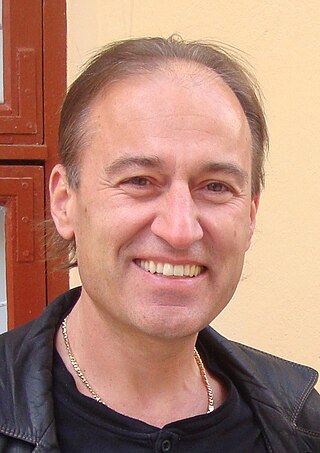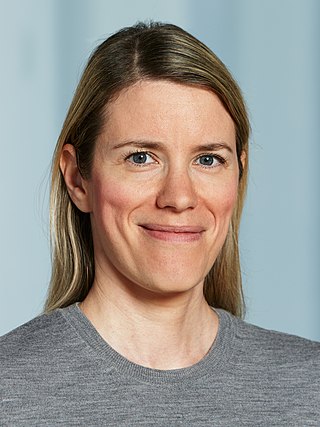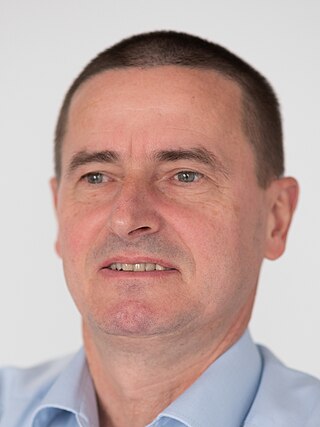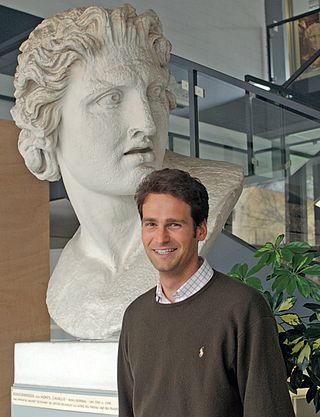Related Research Articles

The Technische Universität Darmstadt, commonly known as TU Darmstadt, is a research university in the city of Darmstadt, Germany. It was founded in 1877 and received the right to award doctorates in 1899. In 1882, it was the first university in the world to set up a chair in electrical engineering. In 1883, the university founded the first faculty of electrical engineering and introduced the world's first degree course in electrical engineering. In 2004, it became the first German university to be declared as an autonomous university. TU Darmstadt has assumed a pioneering role in Germany. Computer science, electrical engineering, artificial intelligence, mechatronics, business informatics, political science and many more courses were introduced as scientific disciplines in Germany by Darmstadt faculty.

Computer graphics is a sub-field of computer science which studies methods for digitally synthesizing and manipulating visual content. Although the term often refers to the study of three-dimensional computer graphics, it also encompasses two-dimensional graphics and image processing.
The Heinz Maier-Leibnitz-Preis, in honor and memory of the German physicist Heinz Maier-Leibnitz, is funded by the Bundesministerium für Bildung und Forschung, and it is awarded by a selection committee appointed by the Deutsche Forschungsgemeinschaft and the BMBF. Since 2013, there are ten recipients of the prize and each receives 20,000 Euros, which is an increase over the original 16,000 Euros that had been given to six recipients per year until 2012.
Symposium on Geometry Processing (SGP) is an annual symposium hosted by the European Association For Computer Graphics (Eurographics). The goal of the symposium is to present and discuss new research ideas and results in geometry processing. The conference is geared toward the discussion of mathematical foundations and practical algorithms for the processing of complex geometric data sets, ranging from acquisition and editing all the way to animation, transmission and display. As such, it draws on many disciplines spanning pure and applied mathematics, computer science, and engineering. The proceedings of SGP appear as a special issue of the Computer Graphics Forum, the International Journal of the Eurographics Association. Since 2011, SGP has held a two-day "graduate school" preceding the conference, typically composed of workshop-style courses from subfield experts.
Emmerich (Emo) Welzl is a computer scientist known for his research in computational geometry. He is a professor in the Institute for Theoretical Computer Science at ETH Zurich in Switzerland.

Markus Gross is a Professor of Computer science at the Swiss Federal Institute of Technology Zürich (ETH), head of its Computer Graphics Laboratory, and the director of Disney Research, Zurich. His research interests include physically based modeling, computer animation, immersive displays, and video technology. He has published more than 430 scientific papers on algorithms and methods in the field of computer graphics and computer vision, and holds more than 30 patents. He has graduated more than 60 Ph.D. students.
Leif Kobbelt is a German university professor for Computer Science with a specialization in Computer Graphics. Since 2001 he is the head of the Institute for Computer Graphics and Multimedia at RWTH Aachen university.

José Luis Moreira da Encarnação is a Portuguese computer scientist, Professor Emeritus at the Department of Computer Science of the Technische Universität Darmstadt in Germany and a senior technology and innovation advisor to governments, multinational companies, research institutions and organizations, and foundations. He is involved in the development of research agendas and innovation strategies for socio-economic development with a focus on emerging economies. He is also a member of the Topical Network Information and Communication Technology (ICT) and ICT-related activities of the German National Academy of Science and Engineering (acatech) and the German Berlin-Brandenburg Academy of Sciences and Humanities (BBAW). He is an elected member of the ACM SIGGRAPH Academy (USA).
Nuno Maulide, is a Portuguese chemist and scientist, currently professor of organic chemistry at the University of Vienna, as well as a science-related writer and speaker. He is also an amateur pianist. Son of a Mozambican father and a São Toméan mother, who were physicians, he was the first black professor at the institution in over six centuries of existence. He is also involved in science divulgation and the popularization of chemistry, especially for children.
Klaus-Robert Müller is a German computer scientist and physicist, most noted for his work in machine learning and brain–computer interfaces.
Joachim Küpper is a professor of romance studies and comparative literature at the Freie Universität Berlin. Küpper has published on authors from various periods, including Homer, Dante, Petrarch, Shakespeare, Francisco de Quevedo, Pedro Calderón de la Barca, Lope de Vega, Alessandro Manzoni, Balzac, Flaubert, Theodor Fontane, and Alain Robbe-Grillet. In addition, he works on problems of literary theory and intellectual history. He is the author of eight monographs and approximately 100 articles, as well as the editor of numerous volumes and scholarly journals.
Philipp Kanske is a German psychologist and neuroscientist. He is professor at Technische Universität Dresden. His research focuses on the neuronal foundations of emotion, emotion regulation and emotion understanding, as well as their changes in mental disorders. Philipp Kanske is speaker of the Junge Akademie.
Stefan Roth is a German computer scientist, professor of computer science and dean of the department of computer science of the Technische Universität Darmstadt. He heads the Visual Inference Lab.

Olga Sorkine-Hornung is a professor of Computer Science at ETH Zurich working in the fields of computer graphics, geometric modeling and geometry processing. She has received multiple awards, including the ACM SIGGRAPH Significant New Researcher Award in 2011.
Nicole Megow is a German discrete mathematician and theoretical computer scientist whose research topics include combinatorial optimization, approximation algorithms, and online algorithms for scheduling. She is a professor in the faculty of mathematics and computer science at the University of Bremen.

Eric Bodden is a German computer scientist. He holds the Chair of Secure Software Engineering at the Heinz Nixdorf Institute of the Paderborn University and is Director of Software Engineering and IT Security at the Fraunhofer Institute for Mechatronic Design (IEM). He is also head of the engineering department in the Collaborative Research Centre 1119 CROSSING at the Technical University of Darmstadt.

Eduard Gröller' is an Austrian computer scientist and professor at the Technische Universität Wien.
Volker Markl is a German computer scientist and database systems researcher.

Jonas Grethlein is a German scholar of Ancient Greek literature. Having received a doctorate from the University of Freiburg, he is a professor of Ancient Greek at Heidelberg University. His academic work has focused on Greek tragedy, the Homeric epics, narratology, and historiography. In 2012, he was awarded a Starting Grant of about €1.4 Million by the European Research Council.
Kai Lawonn is a German computer scientist. He works in the field of exploratory data analysis and visualization and has been a full professor at the University of Jena at the Institute of Computer Science since 2019.
References
- ↑ "Marc Alexa CV" (PDF).
- ↑ "Symposium on Geometry Processing – Awards". awards.geometryprocessing.org.
- ↑ "MATH+ Member Marc Alexa Received ERC Advanced Grant". MATH+. Retrieved 2022-05-16.
- ↑ "Fellows – Eurographics".
- ↑ "Outstanding Technical Contributions Award 2014 – Marc Alexa". Eurographics. Retrieved 2022-05-16.
- ↑ "Engineering Science Prize of the Academy – Berlin-Brandenburg Academy of Sciences and Humanities". www.bbaw.de.
- ↑ "Expressive Shape: Intuitive Creative and Optimization of 3D Geometry (XShape)". European Research Council. Retrieved 2021-10-20.
- ↑ "Heinz Maier-Leibnitz-Preis 2003". www.dfg.de.